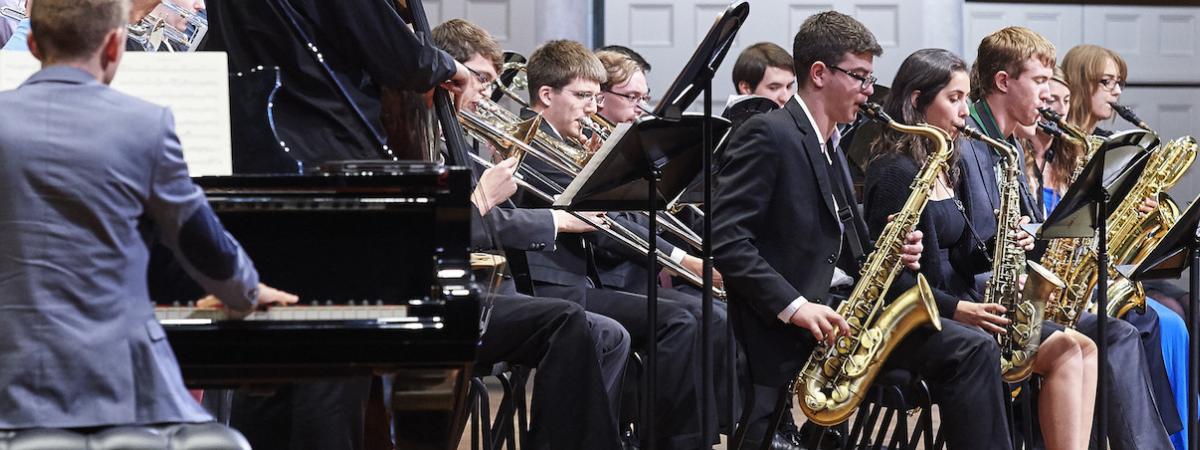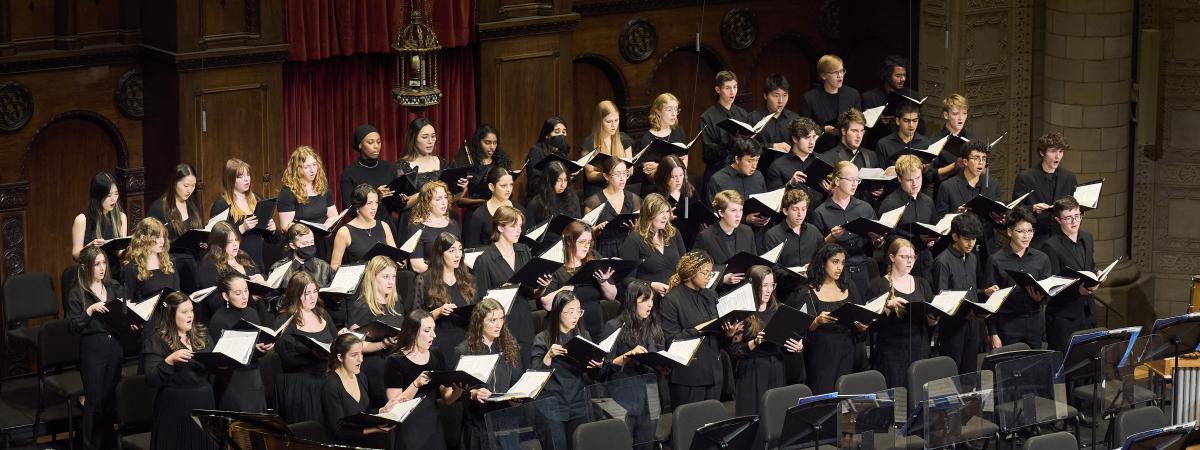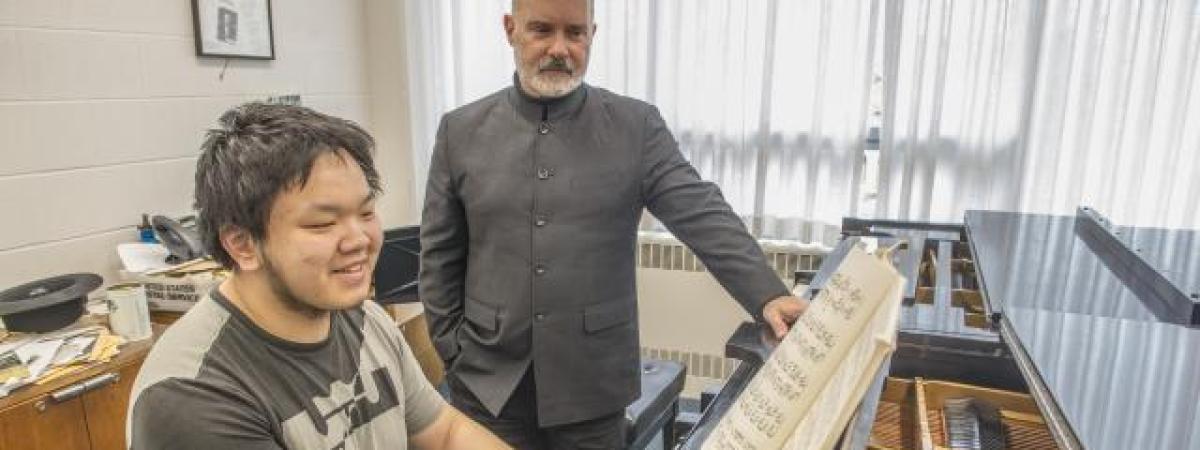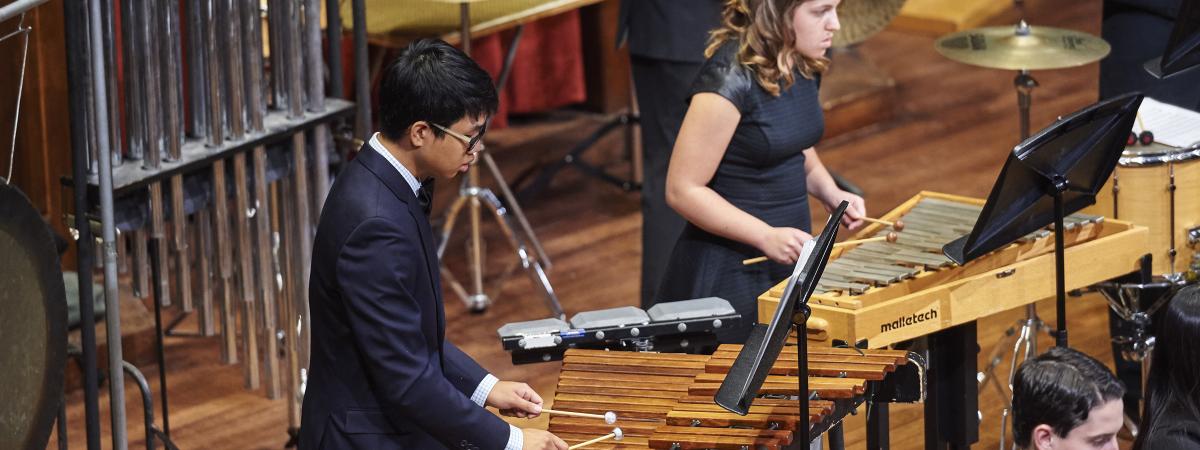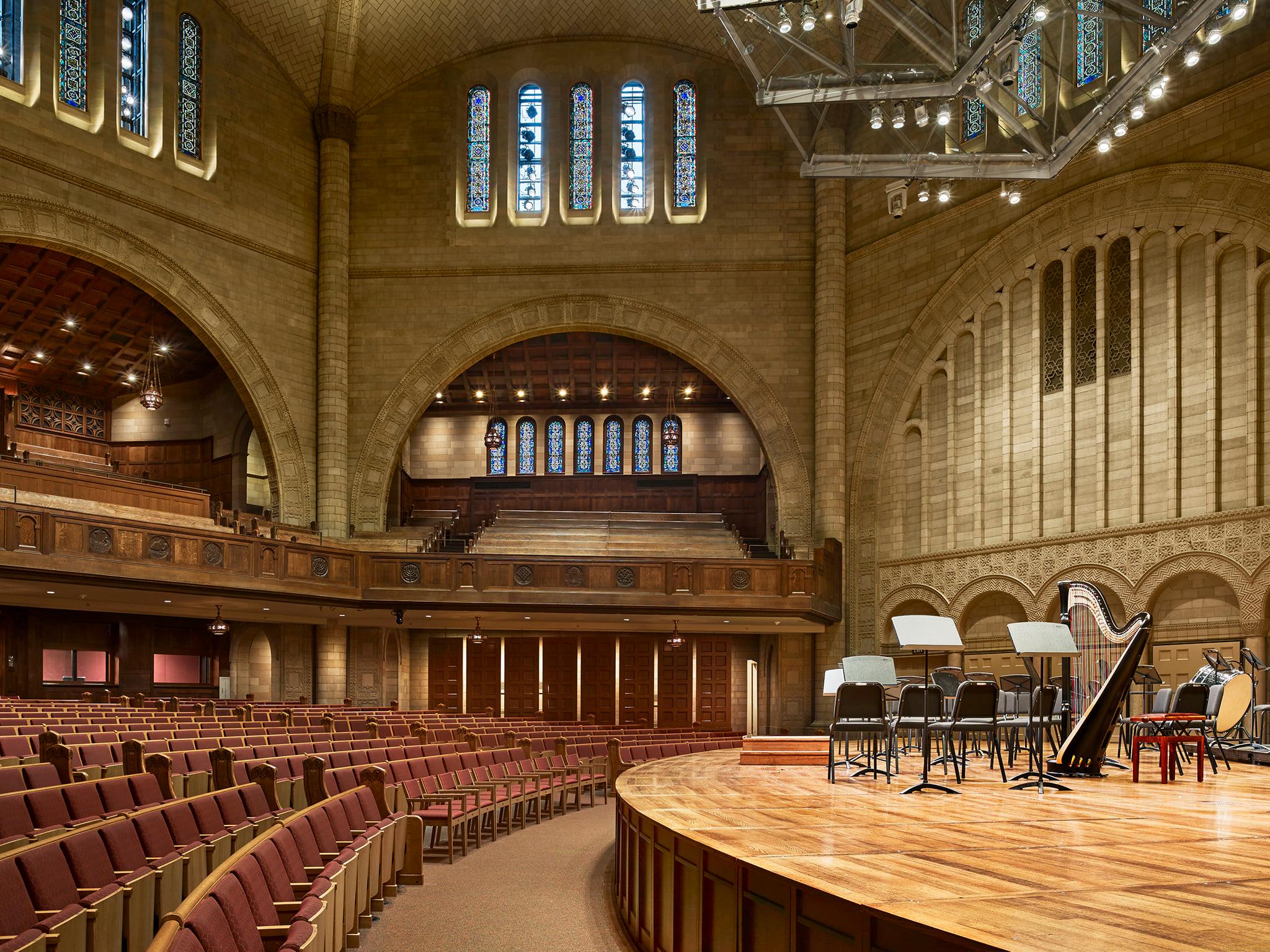Each year, hundreds of students—across all majors—make great music, collaborate on creative projects, develop new skills, pursue personal passions, and build community. CWRU Ensembles and the Joint Music Program are dedicated to providing meaningful educational and artistic opportunities for students and qualified community members.
New students are encouraged to attend the Ensembles Overview during Discover Week. Meet our ensemble directors and learn more about auditions and placement, school-owned instruments, lockers, practice room access, and upcoming performances.
Get Involved in Music Ensembles
Browse the full list of CWRU ensembles.
Auditions and Placement
Ensembles require an audition once per year for both new and returning members. Auditions take place during the first week of fall semester classes. A fall audition covers the entire academic year. New members may also audition during the first week of the spring semester.
Audition Assignments for Music Majors
All new/continuing music majors will receive assigned audition times for Monday, August 25. The schedule will be posted on or around August 12.
Audition Guidelines by Instrument/Area
- Woodwind, Brass, and Percussion: Follow audition guidelines for Symphonic Winds
- String and Harp: Follow audition guidelines for Symphony Orchestra
- Voice: Follow audition guidelines for Concert Choir
- Piano Majors: Follow audition guidelines for Keyboard Ensemble
- Pianists interested in chamber music: Follow audition guidelines for String/Piano Chamber Music or Mixed (Winds) Chamber Music
Audition Procedures Vary for the Following Groups
- Historical Performance Practice Ensembles
- Popular Music Ensemble (instrumentalists and vocalists)
- Jazz Ensembles I & II
- Klezmer Music
- Ensembles that do not require auditions (e.g., University Chorale, Case Glee Club and Spartan Marching Band)
Note: The Spartan Marching Band meets one week early during orientation. Visit the SMB page to view the pre-season packet.
To ensure equitable access and maintain the quality of our school-owned harp instruments, the following policy must be adhered to by all harp students at Case Western Reserve University.
Audition Requirements for Symphony Orchestra
All harp students wishing to participate in CWRU Ensembles must follow the established audition guidelines for the Case/U. Circle Symphony Orchestra. This includes preparing the required repertoire and attending the scheduled audition sessions as outlined in the orchestra's audition information.
Registration for Private Lessons
To gain access to school-owned harp instruments, students must be registered for private harp lessons through the Department of Music. Prior to registration, students must contact Jody Guinn, Harp Faculty, at jguinn4277@aol.com for approval.
Once approval is granted, students should then fill out the Secondary Lessons: Policies and Pre-Registration Form to complete the enrollment process. This ensures that all necessary arrangements are made, and students have the instructional support needed for their studies.
Instrument Use and Care
Students granted access to school-owned harps are responsible for the proper care and maintenance of the instruments. Any damage or issues must be reported immediately to the Nicholas Strawn, Performance and Operations Assistant, at nas158@case.edu.
Students must request building and storage access for the harp by emailing Nicholas Strawn (nas158@case.edu). This step ensures that students have the necessary access to the facilities where the instruments are kept, allowing for secure and convenient use.
By adhering to these guidelines, harp students can fully participate in the university's music programs while ensuring that our instruments remain in excellent condition for future students.
For any questions or further clarification, please contact Nicholas Strawn (nas158@case.edu).
Enrollment permissions are granted in the Student Information System (SIS) following a successful audition or after the first class meeting.
Once course permissions have been granted, students should return to their SIS account to register for the appropriate MUEN course.
The Drop/Add Period ends on the 2nd Friday of the semester.
Most ensembles offer variable credit (0.00 to 1.00 units), so you can participate without exceeding the 19-credit semester limit.
Some small ensembles require concurrent enrollment in either Symphony Orchestra or Symphonic Winds.
Visit our Current Resources FAQ for details about building access, practice rooms, and instrument storage lockers.
Explore our Facilities and Polices Hub for additional resources.
Private Lessons for Non-Majors
All current CWRU students can take applied music lessons for academic credit through the Joint Music Program with Cleveland Institute of Music faculty members.
Before the First Week of Class
Submit the Pre-Registration Form
- Policies & Pre-Registration Form for Secondary Lessons –Use this form to request secondary lessons:
- MUAP 131: Undergraduate music majors or minors/non-majors
- MUAP 531: Graduate students enrolled in a program outside of music
Enrollment Overview
Prerequisite for Beginners in Piano, Voice or Guitar
Students with little or no prior experience in piano, voice or guitar must first take the corresponding Group Music Class for Beginners before enrolling in secondary lessons.
Instructional Fees
Applied lesson instructional fees are added to the term bill (per semester) for music minors and non-majors at the end of the drop/add period. Rates are $750 for 30-minute lessons (1.00 credit units) or $1,500 for 60-minute weekly lessons (2.00 credit units).
Permissions and Registration
- Students should make every effort to register in SIS and schedule their weekly lesson time with their instructor before each new term. The drop/add period ends on the 2nd Friday of the semester.
- Your studio placement is assigned by the Cleveland Institute of Music (CIM).
- The course enrollment permission is granted in SIS by the CWRU Music Office. Locate the course under the "permissions" tab in your SIS account.
- If your schedule doesn’t align with your assigned instructor, please reply to your confirmation email to make alternative arrangements.
- Complete your registration before the end of the drop/add period.
- If you choose not to enroll in lessons, notify us at music@case.edu before the end of the drop/add period.
Group Classes for Beginners
Learn fundamental skills and techniques, develop the ability to play solo or in an ensemble, and connect with your peers! This course is intended for undergraduate non-music-major students with little or no previous musical experience seeking instruction in either piano, voice or guitar. Taught by Cleveland Institute of Music instructors and made available through the Joint Music Program.
Note: Students who complete MUSP 100 (fall) can register for MUSP 130 (spring). Additionally, students with limited experience, though not complete beginners, may consider enrolling in MUSP 130 with approval from the instructor. This could be a helpful step before advancing to MUAP classes.
- Group setting with up to 8 students
- Class will meet once per week for 15 weeks
- 1.00 credit units
- No pre-requisite for MUSP 100
- Guitar students must own or possess a full or 3/4 sized nylon (preferred) or steel string acoustic guitar
- Students are provided access to CWRU Department of Music practice rooms
This course is intended for undergraduate non-music-major students with little or no previous musical experience seeking instruction in either piano, voice or guitar. The class will meet once per week for 15 weeks.
- Piano students will cover basic keyboard technique, staff-reading, harmonization, ensemble playing and improvisation.
- Guitar students will cover left and right-hand technique, notational systems commonly used with guitar repertoire, basic chords, single note melodies, and improvisation in a mix of solo repertoire and ensemble playing.
- Voice students will explore healthy vocal technique, tone production, breathing, diction, physiology, musical style and related theoretical topics. There is no pre-requisite for this course.
Photo: Silver Hall (Maltz Performing Arts Center)
This course is intended for undergraduate non-music-major students who have completed MUSP 100 and are seeking to further develop their skills in either piano, voice or guitar. This course will meet once per week for 15 weeks and is intended to build on the skills developed in MUSP 100.
- Piano students will develop greater fluency reading from the staff and will develop familiarity with more complex harmonization, ensemble playing, sight-reading and transposition exercises.
- Guitar students will focus on furthering the technical development of the right and left hands, reading music primarily in staff notation, improvising, and relevant theoretical concepts.
- Voice students will build on the development of healthy vocal technique, tone production, breathing, diction, physiology, musical style and related theoretical topics as required by more demanding repertoire and vocal exercises. Students completing MUSP 130 will be eligible to register for individual applied lessons on these instruments.
Prereq: MUSP 100; consent required.


